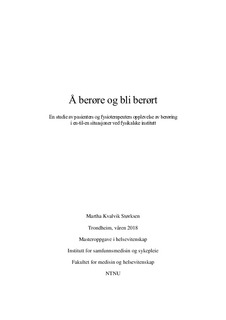Å berøre og bli berørt - En studie av pasienters og fysioterapeuters opplevelse av berøring i en-til-en situasjoner ved fysikalske institutt
Master thesis
Permanent lenke
http://hdl.handle.net/11250/2568190Utgivelsesdato
2018Metadata
Vis full innførselSamlinger
Sammendrag
Hensikten med denne studien var å finne ut hvordan berøring oppleves for pasienter og fysioterapeuter. Til å være en såpass stor del av faget har berøring fått nokså lite oppmerksomhet i fysioterapiforskning, og det har vært spesielt lite fokus på selve opplevelsen av berøring. Basert på et kroppsfenomenologisk perspektiv har denne oppgaven forsøkt å undersøke fenomenet berøring i fysioterapi nærmere. Dataene er samlet inn gjennom halvstrukturerte intervju i etterkant av observasjon av to behandlinger. Utvalget bestod av til sammen ti informanter. Fem pasienter og fem fysioterapeuter. Av pasientene var tre kvinner og to menn, av fysioterapeutene var også tre kvinner og to menn. Alle fysioterapeutene jobbet ved fysikalske institutt, og det var ingen krav til type behandling utover at den skulle inneholde en eller annen form for berøring.
Dataene har blitt analysert ved hjelp av systematisk tekstkondensering og funnene i studien knyttes i stor grad til berøringens mange aspekter. Berøring handler om mer enn å fysisk ta på eller bli tatt på. Alle informantene opplever berøring både som fysisk og psykisk. Pasientene snakker om at berøring handler om å bli sett, tatt på alvor og ‘holdt i hånden’ av fysioterapeuten. Flere av fysioterapeutene ser pasienten som levd liv med sin egen unike historie. En del av informantene mener fysioterapeuter har en spesiell mulighet til å komme nær pasientene sine, som mange andre yrkesgrupper ikke har, og at berøring kan være et sterkt virkemiddel som åpner opp for pasientens følelser, hvis forholdene ligger til rette for det. For å være så nær pasientene kreves det en trygg fysioterapeut som kjenner egne grenser, og som er i stand til å ta inn pasientens reaksjoner og justere seg i forhold til disse. Fysioterapeuten må selv ønske å være nær for at berøringen skal være bra. Relasjonen mellom fysioterapeut og pasient er avgjørende for opplevelsen av berøring, og noen mener at hvem man er som terapeut betyr mer enn hva man gjør. Enkelte fysioterapeuter beskriver en opplevelse av å stå i en skvis mellom de ulike forventningene de må forholde seg til i hverdagen. Forventninger fra pasienter, forventninger de har til seg selv og samfunnets krav om evidensbasert praksis, målbare effekter og politiske føringer om aktive pasienter. Fysioterapeuter presses på en måte ned i en «spagat» som i noen tilfeller kan innvirke på om berøring skal skje og hvordan. Om berøring skal fortsette å være et viktig verktøy i fysioterapifaget må det nok forskes mer på fenomenet. Opplevelsen av og meningen i berøring må gis evidens og løftes opp og frem. The purpose of this study was to investigate how patients and physiotherapists experience touch. Being such a large part of the physiotherapy discipline, touch has received relatively little attention in physiotherapy research, end especially, there has not been much focus on the touch experience. Based on a bodyphenomeological perspective this study has attempted to investigate closer the phenomenon of touch in physiotherapy. The data has been collected through semi structured interviews, following observation of two treatment sessions. In total, ten informants, five patients and five physiotherapists, were interviewed. Among the patients there were three women and two men. Among the physiotherapists, there was also three women and two men. All the physiotherapists were working at a physiotherapy clinic, and there was no requirements as to what kind of treatment were given, except that it should contain touch in some form. The data has been analysed by systematic textcondensation, and the findings of the study is linked to the many aspects of touch. Touch is about more than physically touching or being touched. All the informants experience touch as both physical and psychological. The patients express that touch also is about to be seen, taken seriously, and being ‘led by the hand’ by the physiotherapist. Several of the physiotherapists sees the patients as lived life and history. Some of the informants thinks that physiotherapists have a special opportunity to come close to their patients that many other professions don’t, and that touch can be a powerful tool that opens up for the patients feelings if the conditions are right. Being that close to the patients requires a confident physiotherapist, who knows his or her own boundaries, and are capable of taking in the patients reactions and adjust to them. The physiotherapist must wish and dare to be close for touch to be experienced in a good way. The relation between the physiotherapist and the patient is crucial for the touch experience, and some patients and therapists say that who you are as a therapist can be more important than what you actually do. Some of the physiotherapists describe a sense of being squeezed between the different expectations that they face during a day at the clinic. Expectations from the patients, expectations they have to themselves, and society’s expectations of evidence-based practice, measureable effects, and political guidelines about active patients. Physiotherapists are being forced into “a split”, which in certain situations can influence whether touch can happen, and how. If touch shall continue to be an important tool in physiotherapy, we need more research on the phenomenon of touch. The experience and meaning of the touch itself must be given evidence and be lifted up.
